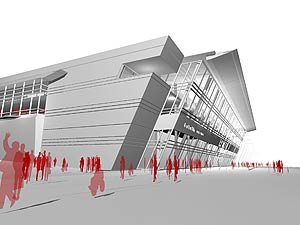|
Audio
Photos
More from MPR
Resources
|
Duluth, Minn. — What's planned is a $67 million expansion of Duluth's waterfront entertainment and convention facility, known as the DECC.
Primarily, the DECC would add a new ice hockey arena for the University of Minnesota Duluth hockey teams. It would replace the DECC's current arena which has been in use since 1966. The new, larger arena would seat 6,630 for hockey, or 8,200 for other events like concerts.
UMD Athletic Director Bob Nielson says the current facility doesn't have enough seating for UMD students, nor the amenities of a newer facility.
"The kind of facility that we're proposing here would put us in a position where we are competitive with the top facilities in the WCHA, which is the nation's premier college hockey league," says Nielson.
A premier hockey arena can help attract the nation's better high school hockey players.
As planned, the University would pick up about one-quarter of the cost, through lease payments and other fees. The city would provide another 25 percent through a 0.75 percent increase in a tax on served food and beverages. The other half, $33.5 million, would come from the State of Minnesota, in this year's bonding bill.
The project didn't make it into Gov. Pawlenty's initial bonding recommendations. Pawlenty withheld his support, pending a public referendum on the food and beverage tax increase. And he wanted evidence that the city was dealing with another big expense. Without changes, Duluth's promise to provide full health care for retirees could bankrupt the city within 20 years.
Duluth officials say they're working on that problem. They've vowed to follow recommendations from an independent task force last fall. Among the recommendations, Duluth Mayor Herb Bergson says it will mean his taking a firm stand when he negotiates new contracts this year with city employees.
"We've met with some of the unions; told them that a defined benefit is not on the table," Bergson says. "They're not going to be offered retiree health care until death, or until Medicare eligible. It's just not going to be offered. If that means impasse, we go to impasse."
With a plan in place, it was time to convince Pawlenty. That meeting came last week. And, according to the governor, it was a success.
"The problem is large and it's serious. But the good news is that Duluth has recognized the problem. The city leaders have come together, have acknowledged the problem, have come up with a road map -- a blueprint to try to solve the problem," says Pawlenty. "Of course, the work is yet to be done. But at least the plan is in place. And if they can implement the plan, that will go a long ways to addressing the concern."
The outcome of labor negotiations may not be clear until the end of the year. But the bonding bill comes up in the next couple of months.
"We need to make the DECC decision now," says Pawlenty. "So we're going to have to take a leap of faith that the city will get these retiree health care benefit issues worked out. Based on what I've just heard, my comfort level has just increased significantly."
Meanwhile, there's a big push in Duluth to pass a public referendum on the food and beverage tax. There's been little opposition. Mayor Herb Bergson expects passage.
"I'm anxious for the referendum," Bergson says. "I'm glad we have it, because I want to see it pass three to one."
After that, Bergson says, the city will have to demonstrate it can put the health care controversy behind.
"Now it's our job to prove to him we're telling the truth, and get it done," says Bergson.
The tax referendum vote is scheduled for Feb. 28. If passed, the DECC proposal should be added to Gov. Pawlenty's bonding recommendations. Lawmakers gather for a short bonding session beginning March 1.







